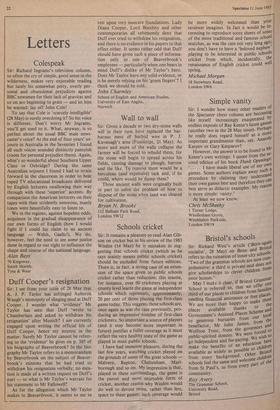Duff Cooper's resignation
Sir: I see from your issue of 28 May that A. J. P. Taylor has infringed Auberon Waugh's monopoly of slinging mud at Duff Cooper. I wonder what 'evidence' Mr Taylor has seen that Duff 'wrote to Chamberlain and asked to withdraw his resignation' after Munich? I am currently engaged upon writing the official life of Duff Cooper, hence my interest in the matter. Surely Mr Taylor cannot be referr- ing to the 'evidence' he gives on p. 385 of his biography of Beaverbrook? In the bio- graphy Mr Taylor refers to a memorandum by Beaverbrook on the subject of Beaver- brook's minions that he had tried to withdraw his resignation verbally; no men- tion is made of a written request on Duff's part — so what is Mr Taylor's warrant for his statement to Mr Fallowell?
M for the allegation which Mr Taylor makes in Beaverbrook, it seems to me to
rest upon very insecure foundations. Lady Diana Cooper, Lord Boothby and other contemporaries all vehemently deny that Duff ever tried to withdraw his resignation, and there is no evidence in his papers to that effect either. It seems rather odd that Duff should have given such a piece of informa- tion only to one of Beaverbrook's employees — particularly when one bears in mind Duff's dislike of Mr Taylor's hero. Does Mr Taylor have any solid evidence, or is he merely relying on his 'green fingers'? I think we should be told.
John Charmley
School of English and American Studies, University of East Anglia, Norwich










































 Previous page
Previous page